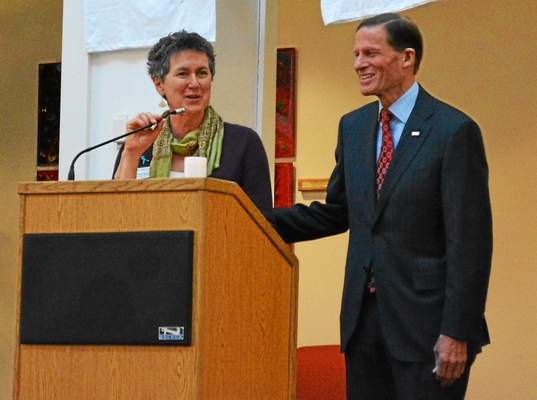Changes at the Susan B. Anthony Project in Torrington
Barbara Spiegel Retiring After 20 Years as Executive Director
By Jude Mead
Barbara Spiegel, the executive director of the Susan B. Anthony Project (SBAP), has lived by the organization’s mission to “[promote] safety, healing, and growth for all survivors of domestic and sexual abuse and [advocate] for the autonomy of women and the end of interpersonal violence.” In June, Spiegel will retire after 20 years of service, but the effects of her dedication, her energy and her passion will remain at the heart of SBAP.
When Spiegel first started working with the crisis and support center in 1995, she could not have anticipated the many accolades she would earn over the years, including The Register Citizen’s 2013 Person of the Year Award for her leadership in providing help to victims of domestic violence and sexual abuse. Her intention at the beginning was simply to do the best job she could to create a safe environment for the clients and provide them with the services they needed.
During her time with SBAP, the annual budget tripled and the staff doubled in size. While Spiegel attributes the growth to community involvement, an active and passionate board of directors and a well-trained and dedicated staff, her leadership qualities played a pivotal role. With a law degree and a master’s degree in counseling, Spiegel handled the steady pressures the job entailed with professionalism and insight. She refers to her role as executive director as a “complicated system with many moving parts,” in which fundraising was her biggest challenge. As she puts it, “It’s a constant.”
Her ongoing fundraising efforts enabled the SBAP to buy and renovate the Old Coe Brass building in Torrington, giving the organization a more spacious work environment and a more central location to better serve all 20 surrounding towns.
The additional space also helped the organization become more adept at meeting clients’ specialized needs. SBAP is now able to tailor its services to include providing educational programs for schools, assigning advocates for children and adults, promoting public awareness, aiding survivors to transition through trauma and helping in other areas, such as with immigration or legal issues.
While all these aspects are important, says Spiegel, the most valuable part of the organization’s role is “education, education, education. No one is immune to domestic violence, no matter what socioeconomic class. It is our entire problem. It is found in our neighbors, friends and community.” That is why “it is our responsibility to stop the patterns from repeating and make people aware of what is a healthy relationship.”
Looking back at her 20 years at SBAP, Spiegel feels that “the project is in great shape to pass on to someone else.” So what will she do now? While her immediate plans include taking some time off to spend with her family, Spiegel thinks she is ready to go in another direction with her professional life. She is ready to take on something entirely new, though she is not yet ready to say exactly what that might be.
Photo by Jill Davenport.

